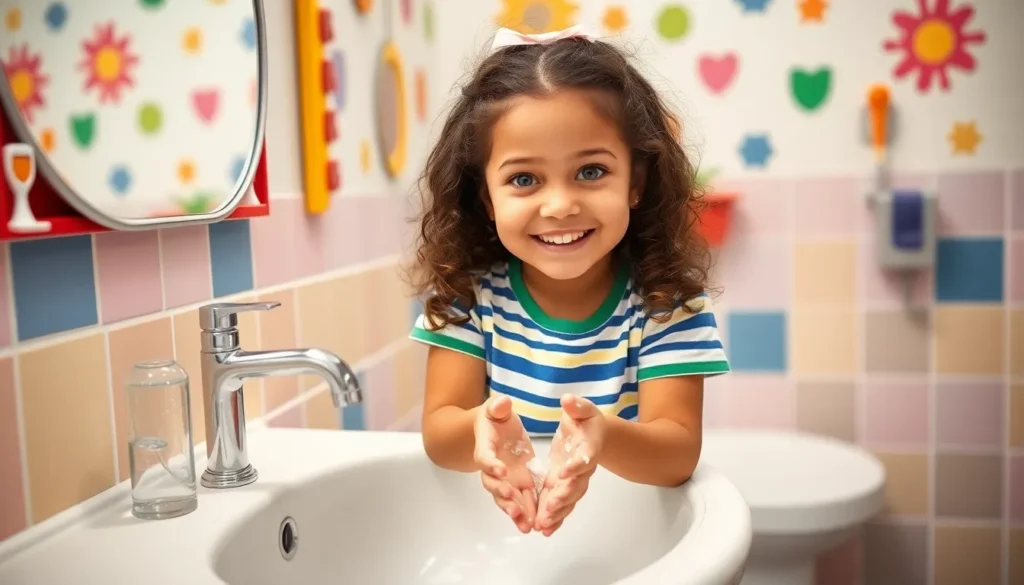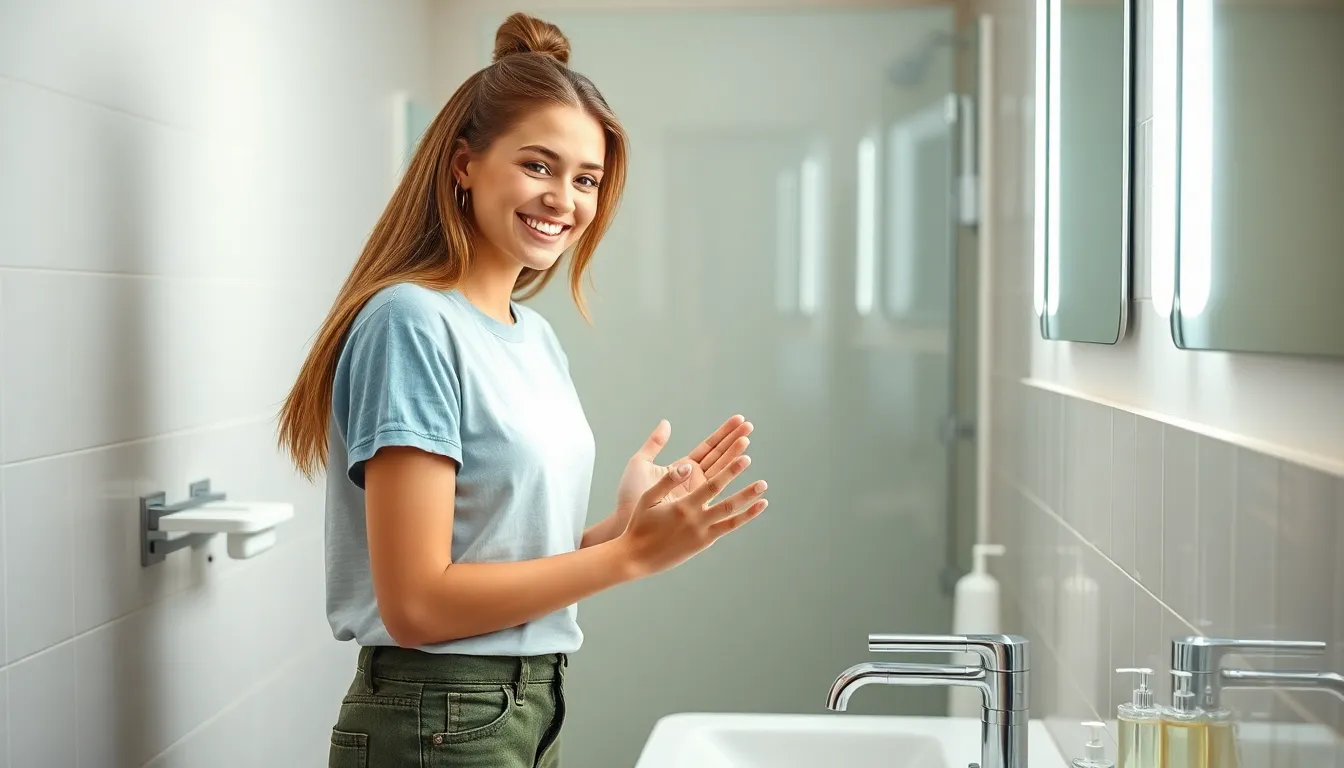Personal hygiene might not be the most glamorous topic, but it’s essential for a happy and healthy life. Think of it as your secret weapon against awkward social situations and unsolicited comments about your odor. Everyone wants to be the fresh-smelling friend, not the one who’s mistaken for a gym bag left in the sun.
Table of Contents
ToggleImportance Of Personal Hygiene Lessons
Personal hygiene lessons play a crucial role in promoting overall health. These lessons help individuals understand the significance of regular handwashing, which can reduce the spread of infections by up to 50%. Teaching proper techniques for brushing teeth also encourages good oral health, minimizing the risk of cavities and gum disease.
Encouraging daily bathing prevents unpleasant body odor and enhances self-esteem. Individuals who practice good hygiene build positive relationships, as they tend to create a more welcoming environment. Learning about cleanliness in various contexts—including personal grooming and clothing hygiene—further contributes to a positive self-image.
Hygiene education assists in preventing the development and transmission of diseases. For instance, approximately 1.8 million children under age five die annually due to conditions that proper hygiene can prevent. People educated about the importance of hygiene are often more likely to adopt healthy habits, leading to a longer, healthier life.
Promoting hygiene through lessons also prepares children for social interactions. Mastering hygiene routines equips them with confidence in public settings, reducing anxiety related to personal appearance. Personal hygiene lessons bolster respect in social situations, encouraging a culture of care and consideration among peers.
Overall, embracing personal hygiene education creates a ripple effect. Families and communities become healthier, fostering an environment where good practices thrive. By prioritizing these lessons, society benefits significantly in terms of well-being and public health outcomes.
Key Elements Of Personal Hygiene
Personal hygiene encompasses essential practices that ensure health and well-being. These habits not only promote good health but also enhance social interactions.
Handwashing Techniques
Effective handwashing techniques significantly reduce the risk of infections. Start by wetting hands with clean running water, then apply soap. Scrub all surfaces, including the backs, between fingers, and under nails. Continue to wash for at least 20 seconds. Rinse hands thoroughly under running water. Dry hands using a clean towel or air dry. Regular handwashing, especially before meals and after using the restroom, cuts down on germ transmission.
Oral Care Practices
Oral care practices are vital for maintaining dental health. Brushing teeth twice a day with fluoride toothpaste helps prevent cavities and gum disease. It’s essential to use a soft bristle toothbrush and replace it every three to four months. Flossing daily removes plaque and food particles between teeth, promoting gum health. Regular dental check-ups every six months aid in early detection of dental issues. Adopting these practices builds confidence and fosters positive interactions through a healthy smile.
Personal Hygiene Lessons For Different Ages
Teaching personal hygiene is crucial at every age. Adopting healthy habits fosters well-being and boosts confidence in social situations.
Lessons For Children
Children benefit from simple personal hygiene lessons. Parents can encourage regular handwashing after using the restroom and before meals. Visual aids, like colorful charts, can help illustrate effective techniques. Daily bathing reinforces the importance of cleanliness, while brushing teeth twice daily sets a foundation for good oral health. Incorporating fun elements, like songs about hygiene, engages kids and makes learning enjoyable. Regular reminders help solidify these practices, ensuring children understand why hygiene matters.
Lessons For Teens And Adults
Teens and adults require more nuanced hygiene education. They should focus on body care, including daily showers, deodorant use, and skincare. Emphasizing oral health, teens must brush and floss daily, and consider regular dental check-ups. Adults benefit from understanding the importance of managing stress and maintaining mental hygiene alongside physical hygiene. Encouraging open discussions about hygiene in social circles improves awareness and confidence. Reinforcing these habits daily leads to healthier relationships and personal satisfaction.
Common Myths About Personal Hygiene
Misconceptions about personal hygiene can lead to poor health practices. Many people believe that showering daily isn’t necessary, but experts recommend daily bathing to eliminate sweat and odor. Relying solely on deodorants without washing can fail to address underlying hygiene issues.
Another myth is that handwashing doesn’t require soap. Soap plays a crucial role in breaking down germs effectively. While water alone can remove some dirt, using soap significantly enhances germ elimination, especially in preventing infections.
People also think that oral care only involves brushing teeth. Flossing is vital for removing food particles and plaque between teeth, where toothbrushes can’t reach. Skipping flossing can result in gum disease and cavities.
Some individuals assume that using antibacterial products will prevent all infections. This isn’t entirely accurate; overuse can lead to resistance and may disrupt the natural balance of bacteria. Opting for regular handwashing with soap is often more effective for overall health.
Believing that personal hygiene education is only for children is fallacious. Teens and adults must also understand and prioritize personal hygiene, including skin care and stress management. Open dialogue about these topics fosters confidence and awareness in all age groups.
Overall, societal beliefs about hygiene can hinder proper practices. Dispelling these myths enhances overall health and well-being, promoting better hygiene habits throughout communities.
Benefits Of Practicing Good Personal Hygiene
Practicing good personal hygiene provides numerous health advantages. Regular handwashing significantly lowers the risk of infections. Studies indicate that effective handwashing can reduce respiratory illnesses by up to 21%. Maintaining proper dental care prevents cavities and gum disease, ensuring a healthy smile throughout life.
Confidence often increases with consistent hygiene practices. When individuals feel clean and fresh, they engage more positively in social situations. Daily bathing eliminates body odor and boosts self-esteem, contributing to better interpersonal relationships.
Positive hygiene habits also foster a culture of health awareness in communities. Children learn essential skills that carry into adulthood, creating a ripple effect. Providing education about handwashing or oral care reinforces healthy behaviors in families, encouraging mutual support.
Moreover, understanding myths surrounding personal hygiene enhances overall health practices. Addressing misconceptions like the necessity of daily showers clarifies proper hygiene routines. Recognizing that handwashing doesn’t always require soap emphasizes the significance of thorough cleaning.
Regular dental check-ups play a crucial role in early issue detection, promoting long-term oral health. Establishing preventive care habits leads to fewer dental problems later on. Encouraging discussions about personal hygiene in social circles boosts awareness and confidence among peers.
Rewards of good hygiene extend beyond personal health. Enhanced well-being cultivates healthier families and improves public health outcomes. Individuals prioritizing hygiene create safer environments, leading to the collective benefit of communities.
Conclusion
Personal hygiene is more than just a routine; it’s a vital aspect of overall well-being. By adopting good hygiene practices, individuals can enhance their health and boost their confidence. Teaching these lessons at various life stages ensures that everyone understands the importance of cleanliness, from children to adults.
Encouraging open discussions about hygiene not only promotes awareness but also helps dispel common myths that can lead to poor practices. Ultimately, prioritizing personal hygiene cultivates a healthier community, fostering positive relationships and improving public health outcomes. Embracing these habits creates a ripple effect that benefits everyone, making it clear that good hygiene is essential for a happy and fulfilling life.











